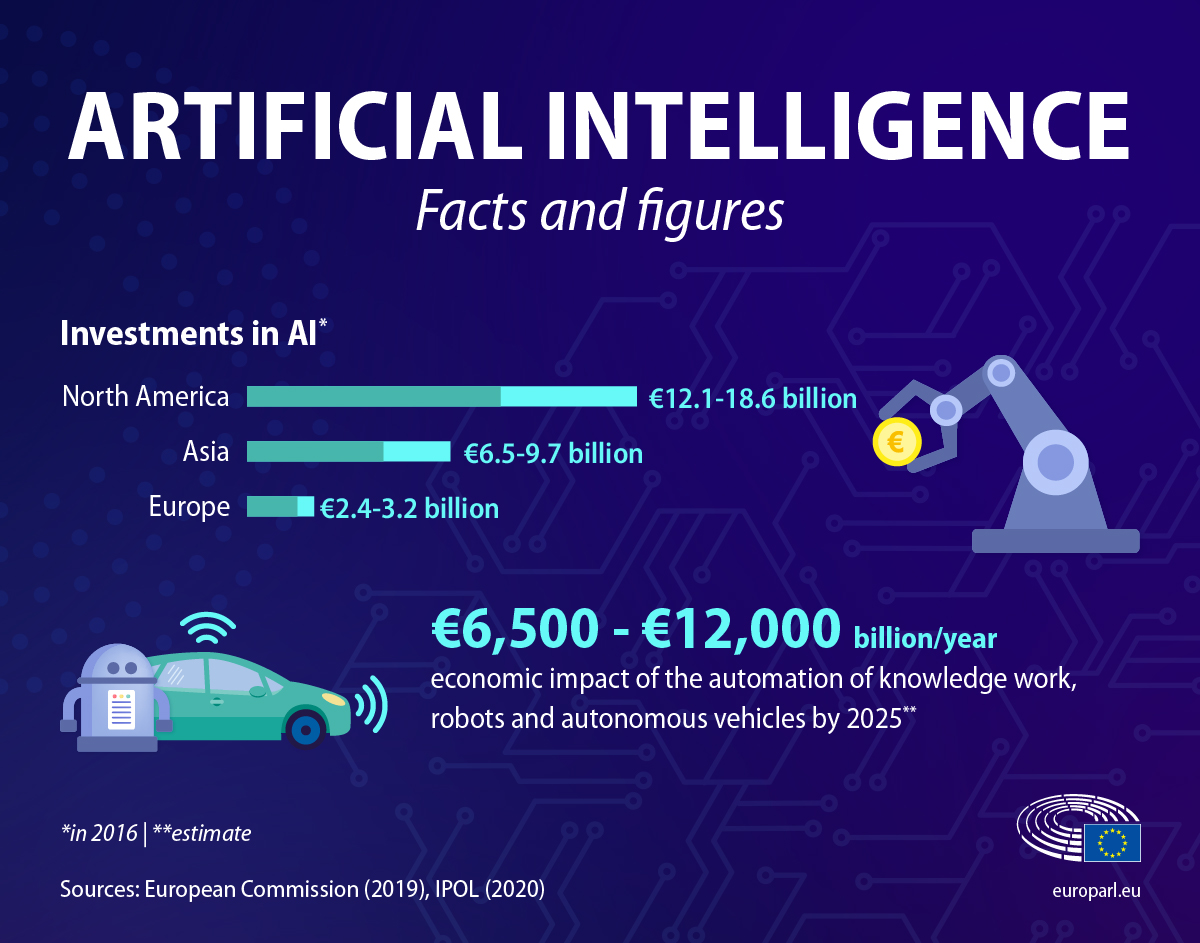Negotiating AI Regulation: The Trump Administration's Role In Shaping European Policy

Table of Contents
The Trump Administration's Approach to AI Regulation
The Trump administration's approach to AI regulation can best be described as laissez-faire, a stark contrast to the more interventionist strategies adopted by other nations like China or the European Union. This hands-off approach significantly influenced the trajectory of AI development and regulation globally.
A Laissez-faire Approach
- Limited Federal Legislation: The Trump administration largely avoided enacting specific federal legislation directly addressing AI. This contrasted sharply with the growing calls for AI regulation from various sectors, including privacy advocates, ethicists, and even some within the tech industry itself.
- Emphasis on Free Markets: The administration's philosophy leaned heavily on the belief that free markets and technological innovation should not be hampered by excessive government regulation. This "move fast and break things" mentality, while fostering innovation in some sectors, left a regulatory vacuum regarding AI’s ethical and societal implications.
- Concerns Regarding Innovation Stifling: While proponents argued this approach maximized innovation, critics expressed concerns about potential negative consequences stemming from the lack of oversight, including algorithmic bias, data privacy breaches, and the misuse of AI in areas like surveillance. Examples include the administration’s limited response to concerns around facial recognition technology and algorithmic bias in criminal justice systems.
Focus on Data Privacy (or lack thereof)
The Trump administration's relatively weak stance on comprehensive data privacy regulations significantly impacted the EU’s approach.
- Limited Federal Data Protection: The US lacked a robust, unified federal data privacy law comparable to the European Union's General Data Protection Regulation (GDPR). This absence of a strong federal counterpoint arguably emboldened the EU to strengthen its own data protection measures.
- Transatlantic Data Flows: The absence of strong US data privacy legislation created friction in transatlantic data flows. Negotiations around data privacy agreements between the US and EU were complicated by this discrepancy, highlighting the impact of divergent regulatory approaches.
- Differing Interpretations of Privacy: Fundamental differences in how the US and EU approached data privacy—a focus on sector-specific legislation in the US vs. a comprehensive approach in the EU—further exacerbated this regulatory divide.
National Security Concerns and AI
The Trump administration viewed AI primarily through a national security lens. This perspective shaped its limited policy initiatives.
- AI and National Defense: While the administration invested in AI research for military applications, a coherent national strategy for broader AI development and oversight remained elusive. This focus on military applications potentially diverted attention from addressing broader societal implications of AI.
- International Collaboration Challenges: The administration's approach often prioritized national interests, potentially hindering international collaborations on AI safety and the development of global AI standards. Concerns arose about the potential for an "AI arms race" fueled by a lack of international cooperation.
- Reports and Statements: Reports from agencies like the Department of Defense highlighted AI’s strategic importance, but lacked comprehensive regulatory frameworks to manage its risks and ethical considerations.
Impact on European AI Policy Development
The Trump administration's approach to AI regulation had a profound and largely unintended consequence: it spurred the European Union to adopt a more proactive and stringent regulatory framework.
The GDPR and the Transatlantic Divide
The absence of a strong US federal data privacy law directly influenced the development and implementation of the GDPR.
- GDPR as a Response: Many argue that the GDPR was, in part, a response to the perceived inadequacy of US data protection measures. The EU sought to establish higher data protection standards to safeguard its citizens' privacy, regardless of where their data was processed.
- Trade and Data Transfers: The GDPR’s stringent requirements regarding data transfers complicated transatlantic data flows, leading to ongoing negotiations and tensions between the US and EU on data privacy and trade.
- Privacy Shield Disputes: The ongoing legal battles surrounding the Privacy Shield framework highlight the fundamental differences in the US and EU approaches to data protection, impacting data transfers and transatlantic cooperation.
EU's Push for Ethical AI
The perceived lack of regulation in the US, coupled with increasing concerns about the societal implications of AI, fueled the EU’s commitment to developing ethical guidelines for AI.
- Ethical AI Guidelines: The EU adopted a more proactive stance, emphasizing ethical considerations in AI development and deployment, including principles like transparency, accountability, and human oversight.
- Contrast with Laissez-faire Approach: These ethical guidelines stand in direct contrast to the Trump administration's hands-off approach, highlighting a fundamental divergence in philosophical approaches to AI regulation.
- EU Initiatives: Initiatives such as the AI Act demonstrate the EU’s commitment to establishing a robust ethical and regulatory framework for AI development and deployment.
Stimulating Innovation vs. Protecting Citizens
The contrasting approaches of the US and EU represent a fundamental tension between fostering innovation and protecting citizens' rights.
- Innovation vs. Regulation: While less stringent regulation might stimulate rapid innovation, it may also increase the risk of harm due to unchecked AI deployment. Conversely, strict regulation can hinder innovation but may better protect citizens from potential harms.
- Economic and Social Impacts: Studies comparing the regulatory landscapes of the US and EU are beginning to emerge, exploring the long-term economic and social consequences of these different approaches.
- Finding a Balance: The challenge lies in finding a balance that fosters innovation while adequately safeguarding citizens' rights and addressing the ethical challenges posed by AI.
Long-term Implications of the Transatlantic Disagreement on AI Regulation
The contrasting approaches to AI regulation adopted by the US and EU have significant long-term implications for international cooperation and the geopolitical landscape.
International AI Cooperation
The divergence in regulatory approaches creates challenges for international collaboration on AI safety and standards.
- Harmonization Challenges: Achieving global harmonization of AI regulations will be difficult given the significant differences in philosophical approaches and regulatory priorities.
- Fragmentation Risks: Lack of harmonization could lead to fragmentation of the AI market, creating barriers to trade and technology transfer.
- Global AI Governance: The need for effective global AI governance mechanisms that address both innovation and ethical concerns is more critical than ever.
Geopolitical Implications
Divergent regulatory landscapes have important geopolitical ramifications for the US and EU.
- Technological Leadership: The regulatory environment significantly impacts a nation's ability to attract investment and foster innovation in the AI sector, influencing technological leadership in the global AI race.
- Economic Competition: The differing approaches may create advantages and disadvantages for businesses in the US and EU, impacting economic competitiveness.
- International Influence: A nation’s approach to AI regulation influences its ability to shape global norms and standards, impacting its influence on the international stage.
Conclusion
The Trump administration's hands-off approach to AI regulation significantly influenced the development of stronger European AI policies, particularly the GDPR and the EU's focus on ethical AI frameworks. This highlights a fundamental difference in philosophical approaches: a US emphasis on free markets and innovation versus an EU prioritization of citizen protection and ethical considerations. The long-term implications are far-reaching, impacting international cooperation, economic competitiveness, and the geopolitical balance of power. Further research and discussion on negotiating AI regulation are crucial. We need to foster international cooperation to establish responsible AI development and deployment worldwide, finding a balanced approach that promotes innovation while effectively protecting the rights and well-being of all citizens. The future of AI depends on our ability to effectively navigate the complex challenges of AI regulation negotiation and create a global framework that prioritizes both progress and responsibility.

Featured Posts
-
 Nfl Draft 2024 First Round Kicks Off In Green Bay
Apr 26, 2025
Nfl Draft 2024 First Round Kicks Off In Green Bay
Apr 26, 2025 -
 Analysis Trump Administrations Efforts To Undermine European Ai Rules
Apr 26, 2025
Analysis Trump Administrations Efforts To Undermine European Ai Rules
Apr 26, 2025 -
 Karen Reads Trials A Year By Year Account
Apr 26, 2025
Karen Reads Trials A Year By Year Account
Apr 26, 2025 -
 Turning Poop Into Prose An Ai Powered Podcast Revolution
Apr 26, 2025
Turning Poop Into Prose An Ai Powered Podcast Revolution
Apr 26, 2025 -
 Are Bmw And Porsche Losing Ground In China An In Depth Analysis
Apr 26, 2025
Are Bmw And Porsche Losing Ground In China An In Depth Analysis
Apr 26, 2025
Latest Posts
-
 Charleston Tennis Pegula Triumphs Over Collins
Apr 27, 2025
Charleston Tennis Pegula Triumphs Over Collins
Apr 27, 2025 -
 Top Seed Pegula Claims Charleston Title After Collins Match
Apr 27, 2025
Top Seed Pegula Claims Charleston Title After Collins Match
Apr 27, 2025 -
 Pegulas Comeback Victory Over Collins In Charleston
Apr 27, 2025
Pegulas Comeback Victory Over Collins In Charleston
Apr 27, 2025 -
 Charleston Open Pegula Upsets Defending Champion Collins
Apr 27, 2025
Charleston Open Pegula Upsets Defending Champion Collins
Apr 27, 2025 -
 Pegula Defeats Collins To Win Charleston Title
Apr 27, 2025
Pegula Defeats Collins To Win Charleston Title
Apr 27, 2025
